
by Anuradha Bakshi | Aug 15, 2009 | manu, okhla
 It was I Day celebrations at pwhy! And a very special one at that. It all began with a request from the special section teachers to drop by their class before I left the building. I was in a for a big surprise. The children had planned an entire show with many items. As I entered the room I was greeted by a warm good morning as all the children sat at one end of the room, with wristbands in the national colours. Manu held a small flag in his hand. The other part of the room was the stage. The show began with some individual items. A song by Champa and two dance items: one by Anjali and the other by Preeti.
It was I Day celebrations at pwhy! And a very special one at that. It all began with a request from the special section teachers to drop by their class before I left the building. I was in a for a big surprise. The children had planned an entire show with many items. As I entered the room I was greeted by a warm good morning as all the children sat at one end of the room, with wristbands in the national colours. Manu held a small flag in his hand. The other part of the room was the stage. The show began with some individual items. A song by Champa and two dance items: one by Anjali and the other by Preeti.
Champa’s song was touching. Here was a girl who can barely look after herself and yet who manages a perfect rendition of an old devotional song. It was awesome. Then came Anjali and she danced with her heart and soul, her awkward body moving with perfect harmony to the tune of a Bolywood hit. But that was not all, the next dance was Preeti’s, the girl who walks on her hands. She danced with her soul and spirit, her arms swaying and her expression perfect. After the individual performances we were treated to a group song: the children sang Bum Bum Bhole from the film Tare Zameen Par, a song celebrating difference. Every one sang, the one who did not hear and the one who could not speak. They sang with their heart, soul and spirit. I sat silent, a knot in my throat and tears welling up my eyes, watching these children of a lesser God. They sang with abandon, as if every dream of theirs was fulfilled, living the moment to its fullest, without a though of what tomorrow held.
The show ended with a very special rendition of the national anthem, one that suddenly acquired a new meaning and lifted all doubts about tomorrow: just for these special souls pwhy had to carry on so that every I Day would be theirs to celebrate.
The Okhla children too celebrated I day, in their garbage dump. A flag was proudly hoisted and songs sung. A poignant reminder that every child of India deserved to be free.
Share some of these very special moments here:
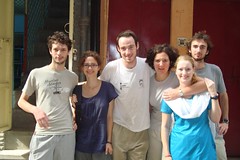
by Anuradha Bakshi | Aug 2, 2009 | okhla, women centre
 For the past three weeks Project why has again be touched by the magic of the SARI Kids. These are a bunch of young students from an ivy league business school in France. They come each year and spread their own brand of love to the children of project why for a whole month.
For the past three weeks Project why has again be touched by the magic of the SARI Kids. These are a bunch of young students from an ivy league business school in France. They come each year and spread their own brand of love to the children of project why for a whole month.
Sophie, Daphne, Justine, Yves, Ted and Simon landed in Delhi on a Tuesday morning and were all set to start their work the very same day. This time we were a little better organised and had made plans for them before their arrival. Two of the four would go to the women centre and live there, and the remaining four would work in our different centres. What never ceases to amaze him with these kids is the ease with which they slip into the role assigned to them. As if it was something they had done all their lives. Never mind the heat, the language barrier, the cultural differences they are here to conquer everything with their hearts.
But that is not all, this unique bunch of kids had spent the whole year raising funds for us. We were tickled to learn that Simon had even made chicken tikkas and mango lassi at the many sales they organised. Armed with their bounty of love they set out to work. This year it is Okhla, the creche and the prep class that are the chosen destinations. Nothing is too forbidding. Never mind the heat, the flies, the torrential rain or the spicy food, these kids mean business.
Within no time at all they have comfortably set into a pattern. Every week the duo that sets out for the women centre changes. Those who go to Okhla set out with the teachers and travel by bus to the centre. Soon bonds are created with the children and the staff and smiles and giggles abound. Plans are made. The bigger children will be taken to an outing this time to the planetarium. The smaller ones will go to a park.
But that is not all. Sophie the President of the association tells us that they would like to buy us things we may need. More plans are made. The women centre decide to spent the money of extending their class by making a new shed on the terrace. Other centres want books, toys, mats, plastic stools a cornucopia of things that would make everyone happy. So it’s shopping time and we are again touched by the generosity of these very unique youngsters.
As I watch them go about their chosen tasks I cannot but wonder at what makes these kids from well to do homes and privileged lands take a whole month off their holidays to come and spread joy and love to a bunch of slum children in India? They do not have to do it, they chose to do so. Just a look at them is enough to know that they do so with their heart braving all the challenges that slum India throws at them each day. And as I watch them I wonder why youngsters of privileged India do not walk the same road. If that did happen things could be so different.
In less than a week the SARI kids will leave us and go their way. They will leave in our hearts an indelible mark and the comforting feeling that all is still well in our world.
God bless them.
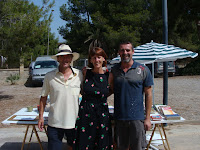
by Anuradha Bakshi | Jul 27, 2009 | okhla
 In Valencia a little town in Spain live three wonderful people: Andy, Irene and Mike. Andy and Irene are old friends. They came some time back and spent a few days at pwhy and helped us build a brand new floor for our Okhla project! I guess they got touched by what I call the magic of project why as form that day onwards they have always been there for us. Running a race or sending regular mails filled with words of support and hope, Irene and Andy have taken us to heir hearts. A few days back Irene wrote tehse simple words: I’ve just read your post on the web site – surviving on promises. Every time I visit the PWhy site, I wish I was rich and could help you more, but I’m not so I just continue to do what I can.
In Valencia a little town in Spain live three wonderful people: Andy, Irene and Mike. Andy and Irene are old friends. They came some time back and spent a few days at pwhy and helped us build a brand new floor for our Okhla project! I guess they got touched by what I call the magic of project why as form that day onwards they have always been there for us. Running a race or sending regular mails filled with words of support and hope, Irene and Andy have taken us to heir hearts. A few days back Irene wrote tehse simple words: I’ve just read your post on the web site – surviving on promises. Every time I visit the PWhy site, I wish I was rich and could help you more, but I’m not so I just continue to do what I can.
And they did just that: convinced their good friend Mike who runs the sale where Irene and Andy run the book stall to support project why! This morning when I opened my inbox there was a warm mail that simply said: We had a wonderful time spreading the Project Why message this morning. One of our neighbours has promised to circulate details to everybody in her email address book, and another has donated four boxes of books, CDs etc for our August stall, so as you can see, PWhy is reaching out into the Valencian community.
Whenever I am down and out and wonder how pwhy will survive, there always comes what I call a message from God. Irene’s mail was just that: a blessed missive reminding me that I cannot give up as pwhy is not just another organisation, it is one that has been woven with threads of love and hope by people who feel for it and want it to live. True the road may sometimes look difficult but it is the one less travelled, the one I have and will always walk as it is filled with exciting surprises and wonderful people like Irene, Andy and Mike.
God bless them all.
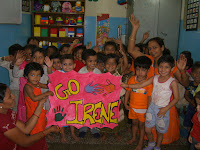
by Anuradha Bakshi | Apr 6, 2009 | okhla
 What kept me going so well yesterday wasn’t only down to training. I kept reminding myself of the reason I was running, which was ‘Anou and the women and kids at Project Why’, and it gave strength to my legs to know that you were thinking of me.
What kept me going so well yesterday wasn’t only down to training. I kept reminding myself of the reason I was running, which was ‘Anou and the women and kids at Project Why’, and it gave strength to my legs to know that you were thinking of me.
These were the words written by an incredible woman who ran a 5 km race in Valencia just for us. She ran the race in 28 minutes and came 270 out of over 4000 runners. Irene started running late in life, when she was well above half a century and this was her first big race that and she ran it for us!
Irene and Andy came to project why for a short week last year and helped us rebuild the floor of our Okhla centre. Since then they have kept in touch and been regular donors to our cause. When Irene decided to run her race we truly thrilled. The creche children made a huge pink poster for her that said : Go Irene. And on the day of the race our thoughts were with her in spite of the thousands of miles that separated us.
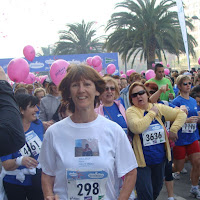 When we saw her pictures we were overjoyed. It was really a special and precious moment. Over the past ten years pwhy has been helped and funded by heartwarming individual initiatives and that is what makes us unique. To some these may seem paltry and inconsequential but that is because they look with their eyes and not with their heart. We were terribly proud of Irene and cheered her with all our heart. You can even see her win the race here.
When we saw her pictures we were overjoyed. It was really a special and precious moment. Over the past ten years pwhy has been helped and funded by heartwarming individual initiatives and that is what makes us unique. To some these may seem paltry and inconsequential but that is because they look with their eyes and not with their heart. We were terribly proud of Irene and cheered her with all our heart. You can even see her win the race here.
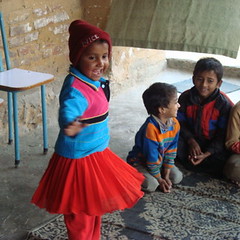
by Anuradha Bakshi | Jan 26, 2009 | okhla
 India celebrates its 6oth Republic Day! All day long there will be ceremonies and parades in different parts of the country. In a remote corner of its capital, on top of a reclaimed garbage dump a bunch of children celebrated Republic Day a day earlier. Two tiny flags on top of a battered speaker marked the occasion. If the props were few the spirit was high. Every child has prepared an item for the occasion.
India celebrates its 6oth Republic Day! All day long there will be ceremonies and parades in different parts of the country. In a remote corner of its capital, on top of a reclaimed garbage dump a bunch of children celebrated Republic Day a day earlier. Two tiny flags on top of a battered speaker marked the occasion. If the props were few the spirit was high. Every child has prepared an item for the occasion.
Little Mithi danced with gay abandon. Her little feet tapping to the beat of the music, a huge smile on her face. There were songs, poems and skits all performed with utmost seriousness and concentration. Yes the little Okhla children celebrated republic day with aplomb! The same happened in other pwhy centres too! I could not be present at all centres and as is often the case lived the moments by proxy courtesy the innumerable photographs taken on the occasion. What was touching is that in each and everyone of them the children were beaming and happy.
These were children of India, protected by the very Constitution that was being commemorated today, the one that was meant to guarantee them a string of rights: justice, liberty, equality words that had scant meaning for these little children. Most of them belonged to extremely poor families, their parents having often fled a flood or a drought or some other calamity to seek greener pastures but sadly found themselves in situations often worse then the one they had left. The pot of gold that they sought remained a chimera.
The children sang and danced oblivious of what awaited them. They were still protected by the innocence of childhood when everything is possible. Tomorrow little Mithi will come to the centre her school bag in tow and will follow her lessons and painstakingly complete all tasks assigned to her. What no one knows is how long it will last: the arrival of a sibling may just put and end to her childhood and her school days. Is this not the plight of many a girl child?
Mithi’s rights are not protected by any Constitution. They simply depend on the vagaries of the reality of her life.
As we celebrate our Republic, my thoughts goes to the millions whose lives hang by a tenuous string in this country that is getting polarised by the minute. As one part of it grows by leaps and bounds to meet a glitzy destiny, the other seems to be sinking with the same rapidity to darker abysses. And yet this is the very one that infuses energy in our lives, the one when hope still lives in the tiny feet of a child dancing, the one where values still rule the day. The one that the world toasts today in a celebrated movie.
If one India is busy debating whether schools should be allowed to increase their already high fees, the other is wondering whether their overcrowded and only school will be sold to build a mall. That is the sad reality of how things as we celebrate yet another Republic Day. I wonder how many more will come and go before all the children in India will the rights enshrined in the very body being honoured today.
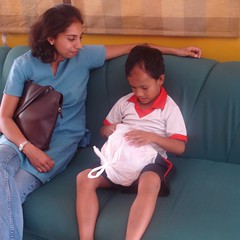
by Anuradha Bakshi | Oct 13, 2008 | fostercare, okhla
Normally it is left to me to blow the project bugle and list its achievements. Not an easy task I must confess. A few days back Megha our Asha stewart was here for the yearly mandatory site visit. She spent a few days at pwhy interacting with staff and children. When she sent me a copy of the report I felt I was looking at pwhy through fresh, candid and honest eyes and was vindicated in many ways and truly overwhelmed. I share the report with all of you.

Project Overview:
Project Why (pwhy) runs a number of centres that provide after school education for children from slums. They also have creches, a centre for disabled children and adults, and a women centre. We supported about half their budget in FY 2007-2008. They have recently begun an initiative, Planet Why to generate income that could be used to support the activities of Project Why.
Site Visit
PWHY was started by Mrs Anouradha Bakshi in 1998 as an endeavour to return her debt to society. It started with English classes for kids from the Govindpuri slums. In a decade they have grown to 13 different centres reaching out to approximately 600 children in three low income/slum areas of New Delhi. The field coordinators are Shamika (her daughter) and Rani (a resident of Govindpuri). Mrs Bakshi is the big picture person and chief fundraiser. Shamika and Rani handle the day to day logistics of pwhy which includes speaking with students, parents, managing teachers and resolving any type of community issue that crops up in their classes. Shamika has trained to work with autistic children and Rani has a degree in nursing. Rani is in fact a product of pwhy, having been one of its first students.
My site visit was spread over a period of one week where I was very cordially taken around the various centres, introduced to teachers and was able to have exhaustive discussions with Anou, Rani, Shamika, Barbara (a visiting volunteer from UK who worked with the British civil services) and Mr. Dharmendra (who runs the women’s centre).
Visit to centres
Pwhy office is located in Govindpuri, gali no 3. A narrow lane leads up to a three story building that the project owns. The ground floor is for mentally and physically challenged children and adults. They are divided into three groups based on the level of their disability. The first floor is a creche for children from 1.5 to 3.5 yrs of age. The disabled children and creche babies are picked up from their homes and dropped off to the centre each morning. The second floor is a primary after school centre and the final landing has an office and small kitchen. Across this building is the foster home and another primary after school centre in a rented accommodation. In Govindpuri, gali no 1 is another creche where I was treated to nursery rhymes and number recitation. Many kids were absent due to a flu that was making the rounds.
A five minutes ride away is a primary after school centre located in the very heart of the Govindpuri slums. A labyrinth of narrow lanes, criss-crossing many homes, kirana shops and recycling businesses leads to a single storey rented accommodation. A gutter along the homes was chock full of unhealthy and smelly sewage. In spite of this I landed into a neat, clean and odor free classroom with children bent over their books and two teachers administrating over 3rd and 4th standard boys. Teacher: student ratios were about 1:10 but this fluctuates with time as the after school program is voluntarily attended by children. I doubt if I would find this classroom without Shamika and Rani seeing as a dizzying circuitous route is needed to reach it!
A ten minutes ride away is the Okhla primary after school centre. This centre has an interesting history. Ms. Sophiya, one of the teachers who has been with pwhy for 7 years urged Anou to start a centre in Okhla slums because the Govindpuri centre was too far for the children and could not in fact accommodate more children. After much debate with the community, one room brick building (10’ X 20’) was built. This structure was repeatedly broken by miscreants from the locality over a period of one year. In Shamika’s words – “Saturday we would lock the room and on Monday nothing would remain.” Pwhy remained persistent and by focusing on their educational activities they were able to convince the community to embrace the learning centre. Today, outside the room a boundary wall has been erected and children sit out here, under a canopy, since they are too many to be accommodated into the room. The roof leaks, there’s a rudimentary toilet since the slum has no plumbing and the kids have to sit through hot summer months under one fan or huddle together in the one room during cold winters. In spite of this the teachers remain resilient and kids look very happy.
Located in the Sanjay colony slums, a five minutes ride from Okhla is another primary education centre. Situated on the first floor, this primary centre has three teachers who were busy with their charges when we visited. The door was locked because dogs were using the ground floor as a sleeping area and bothering the children.
The furthest away is the women’s centre located a twenty-minute ride away from pwhy office, in the Sarita vihar village. This centre runs independently solely due the perseverance of Mr Dharmender, the manager of this centre. Dharmenderji has been with pwhy for 8 years and started as a teacher. Realizing his potential and interest in taking on a bigger role Anou has made him sole in charge for the women’s centre. His commitment and passion are evident by the amount of progress he has made in just 8 months since the inception of this centre. It took several months for him to find the right space and convince a landlord to rent it to an NGO. The interior was then re- designed to accommodate a creche, sewing class room, beautician’s class room, library, room to house women, a kitchen and, a primary as well as middle level after school program. The after school kids occupy space on the terrace under a canopy bravely withstanding the heat (they have only two coolers so children sit close to it by rotation – another innovation by Dharmenderji). Not only does he run the entire outfit but he’s also called on each day to resolve the myriad problems of his students and parents. The after school programs are so successful that he has started a waiting list!
He’s also done a remarkable job with the women who stay at the residential centre. Junoon, who was diagnosed with bipolar disorder was ably handled each time to calm down. She was in rehab when I visited. Having querulous women is also a problem with the neighbouring community who will not tolerate this type of behaviour making his negotiation and diplomatic skills all the more valuable. Dharmenderji is grooming the centre to function independently from him by setting up processes that encourages the various teachers to take more initiative and ownership in their endeavours. Dharmenderji will take over the administrative running of planet why and is wholly committed to making it a reality. Meanwhile his thoughtful, humble and intelligent manner have greatly distinguished his contribution to pwhy and I can’t think of a better manager for planet why.
The women’s centre was also a pilot program to see how project why can run a centre far away from the main office as well as one that ran numerous activities. So far the pilot has been successful and the problems they have had to set it up have provided valuable lessons that they can apply to planet why.
At the Girinagar slums is another rented accommodation. This is located 10 minutes from the main office. The ground floor contains a computer centre that is open to the public. Internet is available at a nominal rate of Rs. 10 per hour and computer classes are also administered here. The first floor is the domain of Mr Naresh perhaps, the most beloved of teachers at pwhy. He teaches maths to the senior secondary students andserves as a valuable role model to all his students. There’s also a library here. From the last batch a student called Janaki ranked 13th in the Delhi CBSE board exams. There aren’t as many senior maths teachers so his role is invaluable. It has been difficult to expand high school after school programs since there are too few maths teachers who can teach in Hindi at that level.
General comments and observations
All centres and classrooms are spotlessly clean. Students are responsible for cleaning them after class. The walls are decorated with charts and the children’s handicrafts. There’s a white board in each centre that is being used as per need – in some they have taken the place of blackboards and in some they are activity boards while in others they have a timetable. It’s particularly nice to have these instead of chalkboards because in the crowded small classrooms chalk dust causes discomfort.
All teachers (except from women’s centre) meet during noon to partake in the daily lunch together. The lunch is provided by pwhy in the terrace of the Govindpuri office. This ritual is very useful as it serves as a forum for the teachers to discuss their problems with Shamika and Rani and between themselves. They exchange stories and solutions. A valuable bonding time has been established.
All pwhy’s transport is taken care of by three autos that are driven by parents of children that attend the schools. They are full time employees of the NGO and they are indispensable. They cart children from various homes in slums to the creche ensuring that the children come to school and ferry Shamika and Rani, and their daily rounds of various centres.
- An unusual feature of pwhy is that teacher retention is high. Two contributing factors to this are All teachers are local i.e., they live in or very close to the slums where they teach
- Teaching provides employment to people who would otherwise have to do manual labour.
One example is Ms Sophiya of the okhla centre who is belongs to the SC/ST class and was unable to get employment as a teacher although qualified for it. Since pwhy doesn’t run schools it can employ people who don’t have teaching degrees but have had an education such as the two brothers Sanjay and Vikki who are lohars (migrants from the blacksmith gypsy community) and lived in a slum that was broken down. They teach the primary classes and if not for pwhy they would not have been able to get good jobs that would use their education.
Over all teachers at pwhy are very proud oftheir work and derive satisfaction from the respect and adoration they receive from the parents and children. Indeed, they are looked upon gratuitously byparents who otherwise, would have treated them with contempt just because of their caste!
There have been exceptions. A few years ago one centre had to be closed because teachers were taking extra tuitions for the children who attended their classes and charged them for the service; essentially they used pwhy for recruitment and space to further their tuition business.
- Except for the foster children and staff no child is explicitly provided with lunch.Most children eat their meal at the govt school under the mid day meal scheme. Children who come to the creche bring their own lunch. I was surprised by this, but Shamika gave me the reason – pwhy feels that parents need to take some responsibility towards the care of their children. The 9-5pm creche provides a safe environment for children of families where both parents work and no one can stay behind to take care of the child. Since pwhy takes a nominal Rs 1/ day per family the lunch acts as an alternate reminder to the parents that they too are participants in the child’s upbringing and not to take pwhy’s role for granted. Of course children who do not bring their lunch are given a portion from the staff lunch.
- Teachers are keen to learn English. An English teacher from US, Ms. Nina plans to work with them to improve their English as well as their teaching methods to grasp the language. Speaking good English is perhaps the best confidence that we can give these children.
- The foster home was an inadvertent addition to pwhy. Encouraged by the donor who was to fund planet why these children were taken in as the first batch of entrants to planet why. When the donor quite abruptly pwhy decided that they had given too many dreams to these children to send them back to their homes (if they had any!) and has continued to take care of them. All except the disabled children will be placed in a boarding school next year. Many are older than they appear but were malnourished and with no education when they were brought in. They have been attending a kindergarten and have caught up to Std 1 education. These children would be a good match for the Support-A-Child program. Anou has already identified an appropriate boarding school for them.
- The boy’s come to school in the morning and girls in the afternoon because the govt school is open for girls in the morning and boys in the afternoon.
- Pwhy attempts to provide a little more than after school education; they are very careful not to refer to their centres as tuition centres as they try and provide a holistic and not just academic education. They have sponsored various open heart surgeries.
- Another nice thing about their processes is that it is very open to change. The organization has a constant influx of volunteers – mostly foreign who spend time here in various capacities. They also interact with other NGOs, most recently with Praxis that carried out a SWOT (Strength, Weakness, opportunities, threats) on their employees.
Overall impressions
Project Why is a vibrant, dynamic organization that works with flexibility and love in the community that they serve. Their teachers are passionate and committed. Ithas a flat organizational structure encouraging its teachers to innovate and share their ideas. The strongest fear the teachers have is what happens if Anou passes away. Although Rani and Shamika are the logistical branches of pwhy it’s Anou’s unflagging spirit and fundraising effort that keeps pwhy running. Her energy is the strength of her teachers. Anou recognizes this and is trying to work towards a model where all her centres are community owned and run. This might take a while to be realized given that some parents are so overwhelmed that even the nominal Rs 1/ day is out of their reach or sometimes they are unwilling to be equal partners because they want things for free. Rani and Shamika are being encouraged to participate in fundraisingactivity. So far their small efforts ( selling raffles in the community or at a college fest)have been resource intensive and without good returns. India being the land of judging a
book by its cover has led them to feel under confident in corporate settings. It’s ironic since these two girls are the ones who interact with each child, parent and teacher in pwhy! I’m sure given the right impetus they will soon take a more proactive role in fundraising.
Asha-Seattle currently supports approximately half of pwhy’s budget and I certainly felt our project partner had exceeded their mission statement and our donor money is going towards building a more educated society.
Project Why
Location: New Delhi
Site Visit Report
25th – 3rd Oct 2008

 It was I Day celebrations at pwhy! And a very special one at that. It all began with a request from the special section teachers to drop by their class before I left the building. I was in a for a big surprise. The children had planned an entire show with many items. As I entered the room I was greeted by a warm good morning as all the children sat at one end of the room, with wristbands in the national colours. Manu held a small flag in his hand. The other part of the room was the stage. The show began with some individual items. A song by Champa and two dance items: one by Anjali and the other by Preeti.
It was I Day celebrations at pwhy! And a very special one at that. It all began with a request from the special section teachers to drop by their class before I left the building. I was in a for a big surprise. The children had planned an entire show with many items. As I entered the room I was greeted by a warm good morning as all the children sat at one end of the room, with wristbands in the national colours. Manu held a small flag in his hand. The other part of the room was the stage. The show began with some individual items. A song by Champa and two dance items: one by Anjali and the other by Preeti.






